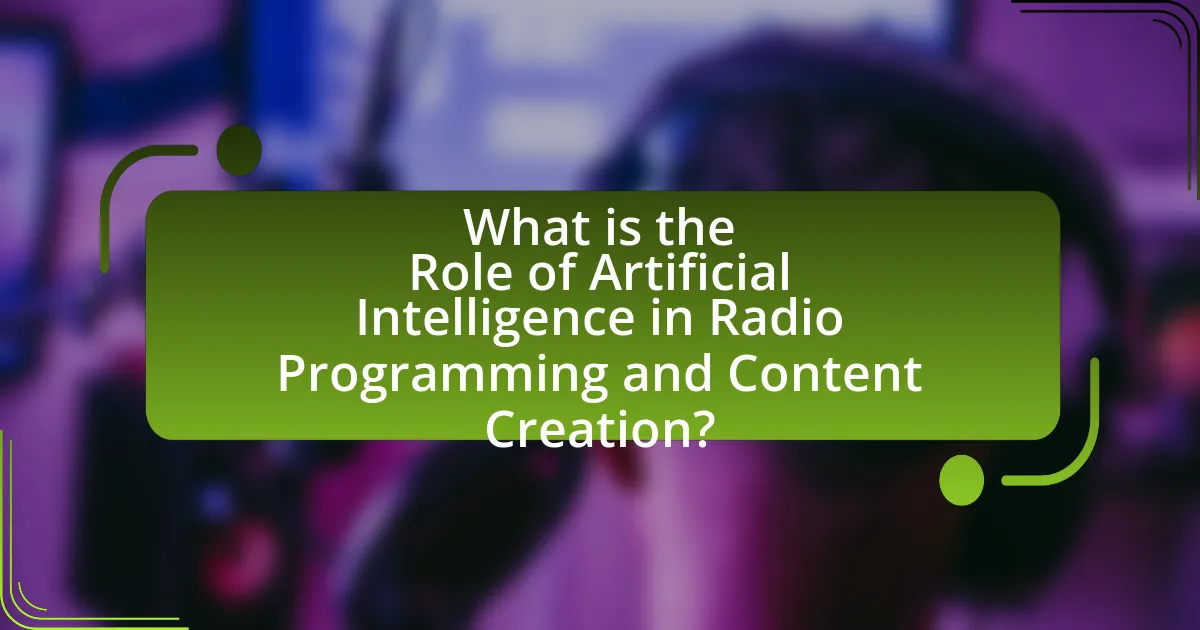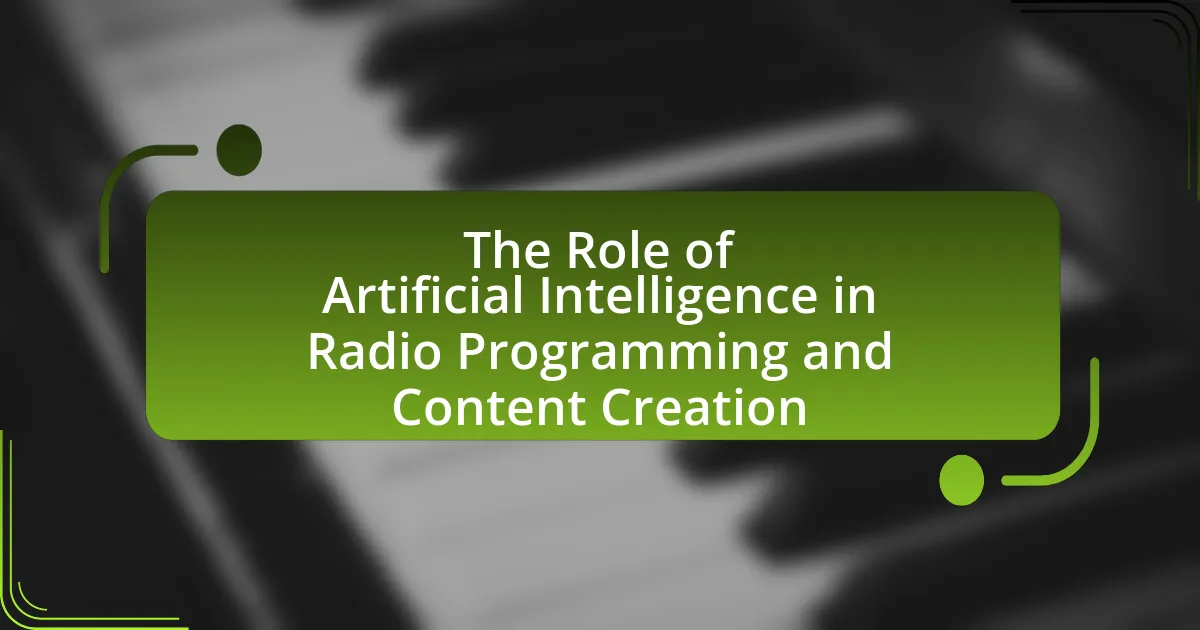Artificial Intelligence (AI) is significantly transforming radio programming and content creation by automating tasks, enhancing personalization, and optimizing audience engagement. AI algorithms analyze listener preferences and behaviors, enabling radio stations to tailor content, curate playlists, and generate scripts efficiently. The integration of AI not only improves operational efficiency but also fosters a more dynamic and responsive programming environment, ultimately leading to increased listener retention and satisfaction. However, the adoption of AI also presents challenges, including ethical considerations and potential job displacement, which radio stations must navigate to fully leverage AI’s capabilities in the industry.

What is the Role of Artificial Intelligence in Radio Programming and Content Creation?
Artificial Intelligence plays a crucial role in radio programming and content creation by automating tasks, enhancing personalization, and optimizing audience engagement. AI algorithms analyze listener preferences and behaviors, allowing radio stations to tailor content to specific demographics, thereby increasing listener retention. For instance, AI-driven tools can curate playlists based on real-time data analysis, ensuring that the music selection aligns with audience tastes. Additionally, AI can generate scripts and content, streamlining the production process and enabling stations to produce more diverse programming efficiently. According to a report by PwC, the integration of AI in media can lead to a 20% increase in operational efficiency, demonstrating its significant impact on the radio industry.
How is Artificial Intelligence transforming radio programming?
Artificial Intelligence is transforming radio programming by enabling personalized content delivery and automating various production processes. AI algorithms analyze listener preferences and behaviors, allowing radio stations to curate playlists and recommend shows tailored to individual tastes, which enhances listener engagement. For instance, platforms like Spotify utilize AI to create personalized playlists based on user data, demonstrating the effectiveness of AI in content customization. Additionally, AI-driven tools streamline production tasks such as voice recognition for transcription, automated news updates, and even content generation, significantly reducing the time and resources required for programming. This shift not only improves operational efficiency but also allows for more dynamic and responsive programming that can adapt to real-time audience feedback.
What specific tasks can AI perform in radio programming?
AI can perform several specific tasks in radio programming, including content generation, audience analysis, and automated scheduling. For instance, AI algorithms can create scripts and playlists tailored to listener preferences by analyzing data from previous broadcasts and audience interactions. Additionally, AI tools can assess listener demographics and engagement metrics, allowing radio stations to refine their programming strategies effectively. Automated scheduling systems powered by AI can optimize broadcast times and content delivery, ensuring that the right programs reach the audience at peak listening times. These capabilities enhance operational efficiency and improve listener satisfaction, demonstrating the significant impact of AI in modern radio programming.
How does AI enhance listener engagement in radio content?
AI enhances listener engagement in radio content by personalizing programming and optimizing content delivery. Through data analysis, AI algorithms can identify listener preferences and behaviors, allowing radio stations to tailor their playlists and programming schedules to match audience interests. For instance, a study by the Pew Research Center found that 70% of listeners prefer personalized content, which AI can facilitate by analyzing listening patterns and suggesting relevant shows or music. Additionally, AI-driven chatbots and interactive features enable real-time audience participation, further increasing engagement by allowing listeners to request songs or provide feedback instantly. This combination of personalization and interactivity leads to a more engaging listening experience, ultimately fostering a stronger connection between the audience and the radio content.
Why is AI important for content creation in radio?
AI is important for content creation in radio because it enhances efficiency and personalization in programming. By analyzing listener data, AI can identify trends and preferences, allowing radio stations to tailor content that resonates with their audience. For instance, a study by Deloitte found that 70% of consumers prefer personalized content, which AI can facilitate through algorithms that curate playlists and suggest topics based on listener behavior. This targeted approach not only improves listener engagement but also increases advertising effectiveness, as advertisers are more likely to invest in platforms that deliver relevant content to their desired demographics.
What advantages does AI offer over traditional content creation methods?
AI offers several advantages over traditional content creation methods, including increased efficiency, scalability, and personalization. AI can generate content rapidly, allowing for the production of large volumes of material in a fraction of the time it would take human creators. For instance, AI algorithms can analyze data and trends to create tailored content that resonates with specific audiences, enhancing engagement. Additionally, studies have shown that AI-driven content can improve SEO performance, as it can optimize keywords and structure based on real-time analytics, leading to better visibility and reach. These capabilities demonstrate that AI not only streamlines the content creation process but also enhances its effectiveness compared to traditional methods.
How does AI influence the diversity of content in radio programming?
AI significantly enhances the diversity of content in radio programming by analyzing listener preferences and generating tailored content. By utilizing algorithms that process vast amounts of data, AI identifies trends and gaps in existing programming, allowing radio stations to create a wider array of shows that cater to diverse audiences. For instance, a study by the Pew Research Center found that AI-driven recommendations can lead to a 30% increase in listener engagement by introducing content that listeners may not have discovered otherwise. This capability not only broadens the range of topics and genres available but also promotes inclusivity by representing underrepresented voices and perspectives in radio content.
What challenges does the integration of AI present in radio?
The integration of AI in radio presents challenges such as potential job displacement, ethical concerns regarding content creation, and the need for significant investment in technology. Job displacement occurs as AI systems can automate tasks traditionally performed by humans, leading to reduced employment opportunities in the industry. Ethical concerns arise from the use of AI in generating content, as it may lack the human touch and creativity that audiences value, potentially resulting in a loss of authenticity. Additionally, radio stations must invest heavily in AI technology and training to effectively implement these systems, which can strain budgets and resources. These challenges highlight the complexities of incorporating AI into radio programming and content creation.
What ethical considerations arise from using AI in radio content creation?
The ethical considerations arising from using AI in radio content creation include issues of transparency, bias, and intellectual property. Transparency is crucial as audiences need to know when content is generated or influenced by AI, which affects trust in the medium. Bias can occur if the AI is trained on skewed data, leading to the perpetuation of stereotypes or misinformation, as evidenced by studies showing that AI systems can reflect societal biases present in their training datasets. Intellectual property concerns arise when AI-generated content raises questions about authorship and ownership, complicating existing copyright laws. These considerations highlight the need for ethical guidelines to govern AI’s role in radio content creation.
How can radio stations address the technical challenges of AI implementation?
Radio stations can address the technical challenges of AI implementation by investing in robust infrastructure and training staff on AI technologies. Upgrading hardware and software systems ensures compatibility with AI tools, while comprehensive training programs equip employees with the necessary skills to effectively utilize AI in programming and content creation. For instance, a study by the Pew Research Center in 2021 highlighted that organizations that prioritize technology training see a 30% increase in successful AI integration. This approach not only mitigates technical issues but also enhances the overall efficiency and creativity of radio programming.
How does AI impact audience analysis in radio programming?
AI significantly enhances audience analysis in radio programming by enabling more precise data collection and interpretation. Through machine learning algorithms, AI can analyze listener behavior, preferences, and demographics in real-time, allowing radio stations to tailor content more effectively. For instance, AI tools can process vast amounts of listener data, identifying trends and patterns that inform programming decisions. According to a 2021 report by the Radio Advertising Bureau, stations utilizing AI-driven analytics saw a 30% increase in audience engagement, demonstrating the technology’s effectiveness in optimizing content to meet listener demands.
What tools does AI provide for understanding listener preferences?
AI provides several tools for understanding listener preferences, including machine learning algorithms, natural language processing, and data analytics platforms. Machine learning algorithms analyze listener behavior and engagement patterns, allowing for personalized content recommendations. Natural language processing enables the analysis of listener feedback and social media interactions, providing insights into audience sentiment and preferences. Data analytics platforms aggregate and visualize listener data, helping radio programmers identify trends and tailor content accordingly. These tools collectively enhance the ability to understand and respond to listener preferences effectively.
How can AI-driven analytics improve programming decisions?
AI-driven analytics can significantly enhance programming decisions by providing data-driven insights that inform content selection and scheduling. These analytics utilize algorithms to analyze listener behavior, preferences, and engagement metrics, enabling programmers to tailor content that resonates with their audience. For instance, a study by Nielsen found that radio stations using AI analytics saw a 20% increase in listener retention by optimizing their playlists based on real-time audience feedback. This demonstrates that AI-driven analytics not only streamline decision-making processes but also lead to more effective programming strategies that align with audience interests.
What are the future trends of AI in radio programming and content creation?
The future trends of AI in radio programming and content creation include personalized content delivery, automated production processes, and enhanced audience engagement. AI algorithms will analyze listener preferences and behaviors to curate tailored playlists and programming schedules, improving listener satisfaction and retention. Additionally, advancements in natural language processing will enable AI to generate scripts and content, streamlining production and reducing costs. For instance, AI-driven tools like OpenAI’s GPT-3 have already demonstrated capabilities in content generation, indicating a shift towards automation in creative processes. Furthermore, AI will facilitate real-time audience interaction through chatbots and voice recognition, allowing for a more dynamic and engaging listening experience. These trends are supported by the growing adoption of AI technologies in various media sectors, highlighting a significant transformation in how radio content is created and consumed.
How might AI evolve in its role within the radio industry?
AI is likely to evolve in the radio industry by enhancing content personalization and automating production processes. As AI algorithms become more sophisticated, they will analyze listener preferences and behaviors to curate tailored playlists and recommend shows, thereby increasing listener engagement. For instance, platforms like Spotify already utilize AI for personalized recommendations, demonstrating the potential for similar applications in radio. Additionally, AI can automate tasks such as scriptwriting, voice synthesis, and even live broadcasting, which can streamline operations and reduce costs. Research indicates that AI-driven automation can improve efficiency by up to 30% in media production environments, showcasing its transformative potential in the radio sector.
What innovations can we expect from AI in radio content delivery?
AI is expected to innovate radio content delivery through personalized programming, automated content generation, and enhanced audience engagement. Personalized programming will utilize machine learning algorithms to analyze listener preferences and deliver tailored content, improving listener satisfaction and retention. Automated content generation will enable AI to create news updates, music playlists, and even entire shows, streamlining production processes and reducing costs. Enhanced audience engagement will be achieved through AI-driven chatbots and interactive features, allowing listeners to participate in real-time discussions and feedback. These innovations are supported by advancements in natural language processing and data analytics, which have shown significant improvements in content relevance and user interaction in various media platforms.
What best practices should radio stations follow when implementing AI?
Radio stations should prioritize data privacy and ethical AI use when implementing AI technologies. Ensuring compliance with regulations like GDPR protects listener data and builds trust. Additionally, integrating AI for audience analysis can enhance content personalization, leading to increased listener engagement. A study by the Pew Research Center indicates that personalized content can improve listener retention by up to 30%. Furthermore, training staff on AI tools fosters a collaborative environment, allowing for better utilization of AI capabilities in programming and content creation.


